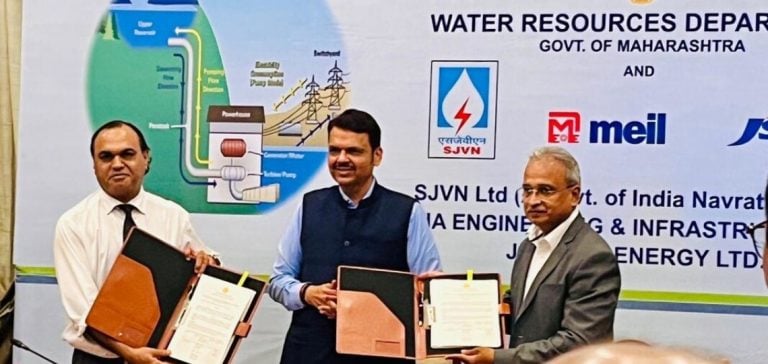Megha Engineering & Infrastructures Limited (MEIL) has signed a Memorandum of Understanding with the Government of Maharashtra for the implementation of two pumped storage hydroelectric projects.
These projects, located in the Nandurbar and Chhatrapati Sambhajinagar districts, have a total capacity of 4,000 MW.
The choice of the “Build-Operate-Maintain” (BOM) model reflects the commitment of both parties to ensuring the efficient operation and maintenance of the power plants over the long term.
With a total estimated investment of 21,100 crores of rupees (around 2.5 billion euros), these projects aim to strengthen the energy infrastructure of the state of Maharashtra, while optimizing the management of electricity flows.
The facilities will provide a minimum daily storage capacity of 6 hours, thus meeting energy needs of the state and the country.
Technology and innovation for the network
The Kamod and Ghosla projects are based on a closed-loop system of upper and lower reservoirs.
This configuration enables the turbines to operate in both directions, pumping water during periods of low demand and generating electricity during peaks in consumption.
Reservoirs will be initially filled from existing water reservoirs, and water will be replenished annually to compensate for natural losses.
The installations will use reversible turbines capable of operating according to the needs of the grid, enabling greater flexibility in managing energy demand.
These systems also allow for better integration of renewable energy sources, such as solar and wind power, which require storage solutions to compensate for their intermittency.
Financial and operational challenges
The total cost of these projects, in the region of 21,100 crores of rupees, reflects the scale of the work required, from the construction of new reservoirs to the installation of pumped storage technology.
The financing is based on a scheme integrated into the State’s energy policy framework, which prioritizes infrastructure capable of meeting decarbonization and energy security objectives.
MEIL is also committed to creating 2,500 direct jobs, thereby strengthening the local economic fabric.
However, there are technical and environmental challenges ahead, particularly in terms of water resource management and implementation timescales.
Regulation and legal framework
These projects are part of Maharashtra’s wider energy policy, which focuses on diversifying energy sources and optimizing storage capacity.
The use of pumped hydro storage projects is supported by the central government, which encourages the development of large-scale storage technologies.
These infrastructures help to stabilize power grids while facilitating the integration of renewable energies.
The Maharashtra government is proactive in supporting this type of project, backed by a regulatory framework that encourages public-private partnerships.
The flexibility of this model means that objectives can be adjusted according to the needs of the region, while taking into account the imperatives of profitability and efficiency.
Impact on India’s energy sector
The Kamod and Ghosla projects illustrate the growing importance of energy storage infrastructures in India, a country facing increasing demand for electricity.
These initiatives mark a step forward in improving grid stability and optimizing demand management capabilities.
They also reinforce Maharashtra’s position as a leader in the development of large-scale energy projects.
India’s energy sector continues to undergo rapid transformation, with a particular focus on storage capacity to support the growth of renewable energies.
In this context, initiatives such as MEIL are of crucial importance in ensuring long-term grid stability.





















